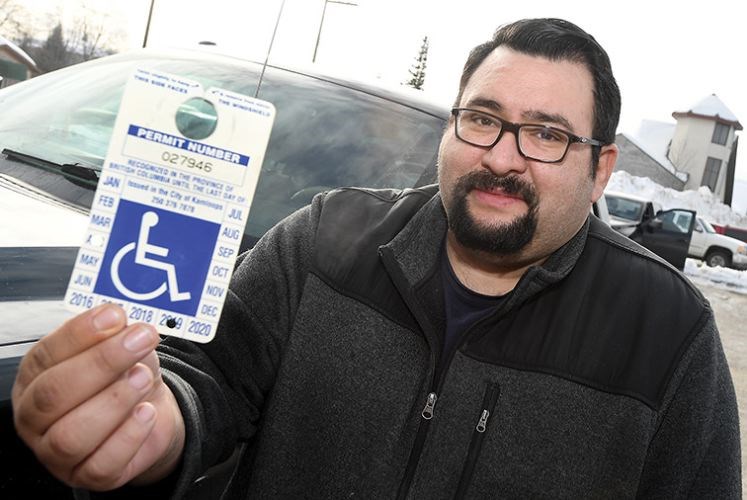Karl Contreras is one of many Prince George drivers with mobility challenges such that he has a placard allowing him to park in the spots designated by law for certain people - and only certain people - to use.
A small segment of the local population has been choosing to park in those stalls despite not having the enabling placard. Contreras can't help but notice them, because they oust him from those spots. When he calls them on it, they are almost always - and this surprised him at first, but not anymore - rude and self-righteous about it.
"When I go to other cities, I never run into this problem, but here in Prince George it is constant and widespread and there is this air of entitlement about it," he said.
One driver he confronted turned the music up loud in the cab of the vehicle to drown out his protests.
Others have simply said "it's cold out" or "I'm tired today" to excuse their use of the designated spots.
The most frequent dismissal he hears is "I'm just going to be a couple of minutes."
He said one elderly couple called over their shoulder as they walked away that "we're old, we are entitled" so he shouted back "age is not a disability."
Contreras has even gotten to know some repeat offenders, the regulars, if you will, and they take even less kindly to his protests.
"I got spat at by one of them," he said.
"He rolled his window down, spat at me, and rolled his window back up. One guy wanted to fight me; he actually offered me a fight over it.
"And not once, not a single time, have I ever heard anyone say sorry for doing it, or vacate the spot for me."
The authorities should also be apologizing, he said, because there is no effort to enforce the rules.
The problem occurs frequently at the school when he's transporting his child to kindergarten. He has gotten only what he describes as empty platitudes from the principal about mounting a response to these drivers.
Once, he and another with a placard were both shut out of their rightful parking stalls at the same time by drivers at the school who did not return in a timely manner. Kindergarten students cannot be released from school except into the care of a pre-approved adult, so neither Contreras nor the other parent could access the school to retrieve their children. Eventually Contreras got the aid of another parent to hold him steady and slowly over the icy conditions to the door and got to the classroom but the other driver's limited mobility was such that other arrangements had to be made, once Contreras alerted the teacher to the impasse outside.
It also happens frequently at shopping centres and grocery stores, he said, and when a store manager has to consider losing a customer - even one who openly flouts the parking laws and common morality - they all too often turn a blind eye.
The City of Prince George reported some good news, though. Contrary to Contreras's belief, the disability parking stalls at shopping centres can absolutely be enforced by the city's bylaw officers.
"Parking control looks for these types of offenses regularly on their patrols of streets and City lots and parkades," said city hall spokesperson Michael Kellett.
"There were 56 tickets issued in 2018. There is no legal difference whether it occurs on a private lot or city lot, however city staff only respond to concerns on private property when requested to do so, due to the availability of resources. All types of parking complaints can be registered by the calling the City at 311 or by phoning Bylaw Services during regular business hours at 250-561-7622."
Contreras knows that when ineligible drivers impose themselves on these special parking spots, they often take much more than the minute they claim they are going to be but they are often long gone by the time an officer can respond.
But, he said, it is such a chronic issue that he felt it would be well worth a city bylaw officer's enforcement time to simply pick random shopping centres and wait for offenders.
Perhaps an enforcement blitz might dissuade such able-bodied drivers from taking advantage of spots for those certified to be in long-term pain and/or unable to move as easily.
"Nobody asks to be disabled," Contreras said, adding that an application to the People In Motion agency, with a detailed doctor's explanation, has to be made to get the placard and a fee must also be paid to have one.
"This is people's lives, we're talking about. Being in pain two-thirds of my day, and then having to confront jerk drivers over this, well, it's frustrating to say the least, it has even been a threat to me, and it just makes it all worse."


